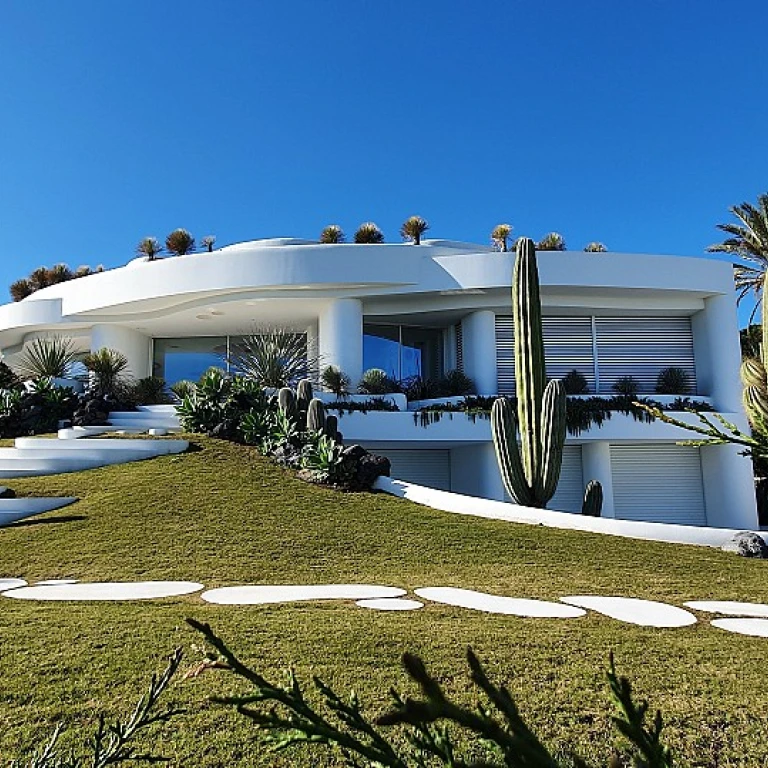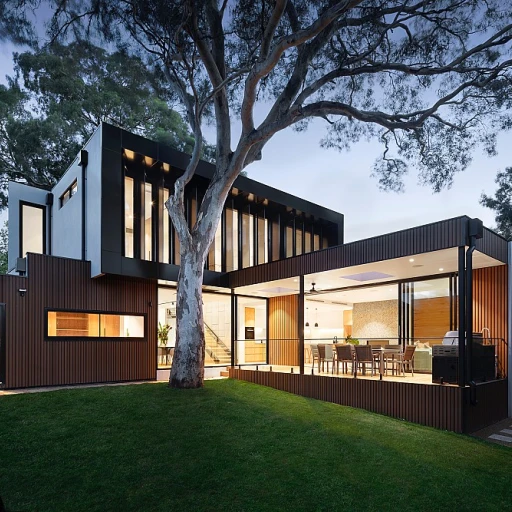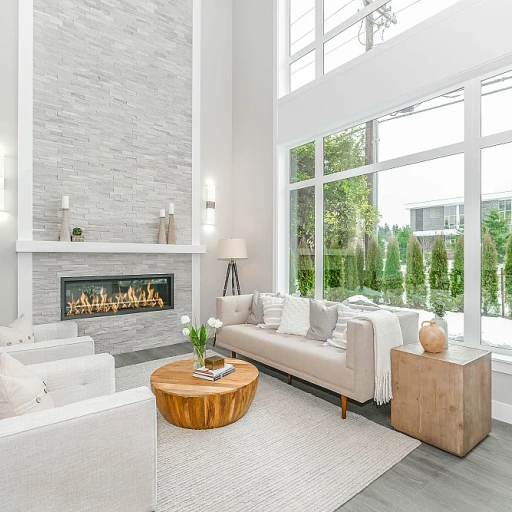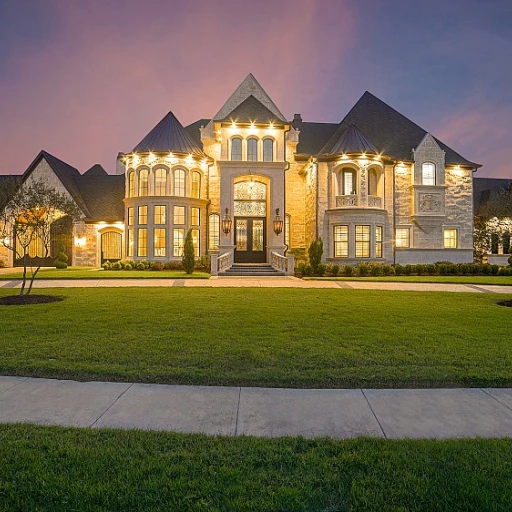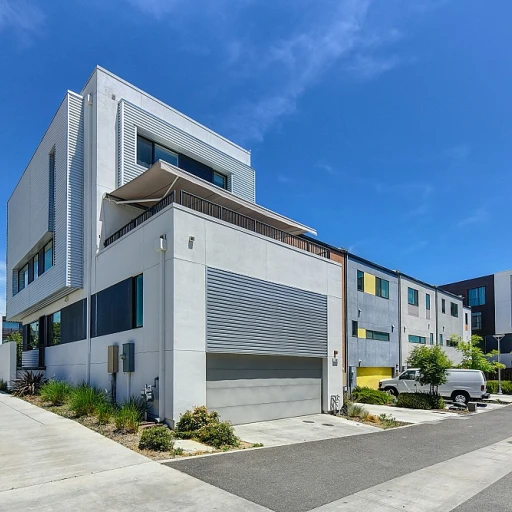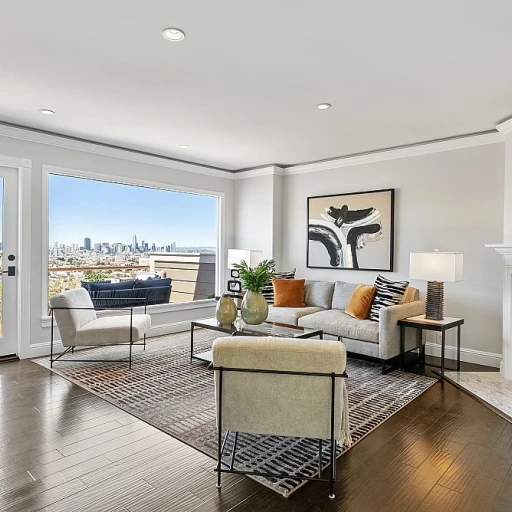The Eco-Luxury Nexus: Marrying Sustainability with Opulence
The Synergy of Sustainability and Affluence
In the realm of exclusive estates, the integration of eco-friendly features and luxurious amenities is not just a trend; it's a revolution that's redefining the sector. Eco-luxury is a term that has gained immense popularity, indicative of a growing demographic of affluent homeowners who align their opulent lifestyles with environmental consciousness. A 2021 report by the National Association of Realtors highlighted that 59% of respondents valued sustainability in high-end properties. Homeowners are now seeking estates that offer both extravagance and eco-innovations.
Diving into the heart of eco-luxury real estate, it's essential to understand how these estates balance indulgence with ecological responsibility. An exclusive estate owner can bask in the comfort of premium finishes and state-of-the-art amenities while contributing to energy conservation and waste reduction. Features like geothermal heating systems, solar panels, and sustainable building materials are becoming status symbols in their own right, as reflected by the 34% increase in renewable energy use in residential properties since 2010 (U.S. Energy Information Administration).
Driving Factors Behind the Eco-Lux Movement
One can draw a direct line between the surge in eco-consciousness and technological advancements. Luxurious residences are not just adopting green technologies; they're pioneering them. Smart home technology melds perfectly with eco-friendly design, optimizing energy use and allowing owners to manage their carbon footprint effortlessly. Technology such as automated lighting, energy-efficient appliances, and smart thermostats not only echo the language of convenience but also that of conservation. The upscale real estate market is responding, with listings featuring such amenities witnessing a 27% uptick in valuation over traditional high-end homes, as per a statistic from Zillow.
The motivators for adopting an eco-innovative approach to luxury living extend beyond personal preference; there's a tangible impact on the market value. Moreover, there's a legislative push with policies such as tax incentives for energy-efficient homes, which promise returns on these eco-centric investments. Regulations and demand for greener living options are promoting advancements in sustainable luxury, making it a wise strategy for estate owners to invest in green upgrades bulking their property's value and appeal.
Eco-Innovation Meets Traditional Opulence
As analysts in the exclusive estate industry, we notice how traditional symbols of luxury—such as expansive spaces and rare materials—are being reinterpreted through the lens of sustainability. For instance, sustainably sourced hardwoods and recycled materials are replacing conventional options for flooring and decor, offering a blend of exclusivity and eco-friendliness. Formerly energy-intensive amenities like pools and landscapes have been redesigned with eco-innovation to lower their environmental burden while maintaining the aesthetic and functional standards expected of high-caliber estates.
The magnetic allure of an environmentally friendly lifestyle doesn't stop at the property line. High-end homeowners are becoming ambassadors for a sustainable future, often influencing their peers and communities. As posited by environmental advocates, 'Luxury must lead'—suggesting that the affluent have a pivotal role to play in spearheading the environmental movement. Ultimately, in the world of luxury estates, exclusivity is no longer just about what one owns but also about the legacy one creates through responsible stewardship of the planet.
Green Technologies Shaping the Future of Exclusive Estates
Revolutionary Green Technologies Elevating Exclusive Properties
As luxury estate owners seek a harmonious blend of comfort and conservation, cutting-edge green technologies are becoming central to the evolution of high-end living spaces. These advanced systems not only promise reduced environmental impact but also bring a level of sophistication and automation that is highly prized in exclusive properties. Take, for instance, the integration of geothermal heating and cooling systems, which harness the earth's steady temperatures to regulate the climate in lavish homes with efficiency and poise.
According to the Environmental Protection Agency, geothermal systems can reduce energy consumption—and related emissions—by up to 44% compared to air-source heat pumps and by 72% compared to electric resistance heating with standard air-conditioning equipment. These statistics reveal the compelling argument for their inclusion in any modern estate where luxury and sustainability are paramount.
Intelligent Water Management for Sustainable Opulence
Estate owners are increasingly aware that water is a precious resource. Smart irrigation systems employ advanced sensors and weather forecasting to deliver water where and when it's needed, reducing waste and ensuring lush landscapes that mirror the opulence within. The integration of rainwater harvesting adds another layer of sustainability, redefining the parameters of eco-luxury living. Properties with sophisticated water management are not only eco-friendly but also offer resilience against water scarcity, a growing concern in many upscale locales.
The market for smart irrigation systems is witnessing a surge, with Zion Market Research reporting that the global smart irrigation market was valued at approximately USD 1.13 billion in 2020 and is expected to generate around USD 2.71 billion by 2028. This jump is a clear indicator of the importance placed on sustainable watering practices in the realm of exclusive estates.
Solar Power: Harnessing the Sun’s Elegance
Exclusive estates are investing in photovoltaic technology to capture the sun's power, reducing reliance on non-renewable energy sources while maintaining the estate's aesthetic and functional opulence. Modern solar panels are designed to blend seamlessly with the property's design, ensuring that the visual integrity of the estate is uncompromised. The financial benefits are also significant — for example, the investment tax credit (ITC), also known as the federal solar tax credit, allows homeowners to deduct 26% of the cost of installing a solar energy system from their federal taxes.
Organic photovoltaic cells, a newer innovation, offer a promising future for integrating solar power into luxury homes. These cells can be crafted into transparent or customizable designs, merging with the architectural flair of an exclusive estate. This blend of design and function is a pinnacle of eco-innovation in the luxury real estate market.
Energy-Efficient Smart Homes: The Interactive Masterpieces
The prestigious estate has long been a canvas for technological artistry, and now, smart home technologies are painting the future of eco-friendly automation. From intelligent LED lighting systems that adjust based on natural light levels to advanced HVAC systems that learn the homeowner's preferences and optimize energy usage accordingly, these smart homes of the future are pioneering the standard for sustainable luxury. With the rise of the Internet of Things (IoT), homeowners can now monitor and control their home's energy consumption with unprecedented precision.
Statista reports that revenue in the Smart Home market amounts to US$90.968 billion in 2022, further emphasizing the growing emphasis on sophisticated and eco-conscious home automation in the luxury market. These smart estates are not merely homes but interactive masterpieces that demonstrate the owner's commitment to an opulent yet environmentally responsible lifestyle.
The Financial Incentives: Eco-Estates and Their Rising Value
Unlock the Value: The Rise in Eco-Estate Investments
In the dynamic world of exclusive estates, the synergy between luxury and sustainability is increasingly recognized. It's no longer just about grandeur but also about green credentials that can elevate the value of a property. Statistics from a recent Forbes report highlight that properties with sustainable features have seen a value increase of up to 30% more than their conventional counterparts. By integrating cutting-edge green technologies, exclusive estate owners can not only contribute to the environment but also reap significant financial benefits.
Financial Benefits of Going Green
- Reduced Operational Costs: Energy-efficient systems and renewable energy sources lead to a substantial decrease in utility bills.
- Higher Market Demand: As environmental awareness grows, there is a burgeoning market for homes that are both luxurious and sustainable, attracting eco-conscious buyers.
- Tax Incentives and Rebates: Governments worldwide are offering tax breaks and incentives for properties that meet certain green standards, adding to the financial advantages.
According to the National Association of Realtors, 59% of agents reported that residential buyers are interested in sustainability. This statistic underlines the importance of eco-innovations in decision-making for high-end estate purchases.
The Appreciation Trajectory of Eco-Estates
Eco-innovation isn't just about today's luxury living – it's an investment in the future. A survey by Knight Frank revealed that properties with strong sustainability scores witness an accelerated appreciation over time. This suggests that creating an eco-friendly environment within an estate isn't just a nod to responsibility; it's a strategic decision that can solidify the estate's long-term financial growth.
Examining the ROI of Eco-Friendly Features
Investing in sustainable features can significantly impact the return on investment (ROI) for elite property owners. A Zillow analysis pointed out that homes with solar panels sold for 4.1% more on average than comparable homes without solar energy. This exemplifies how eco-friendly estate innovations not only contribute to long-term cost savings but also add to the immediate market value of the property.
Case Studies: Leading the Charge in Eco-Friendly Estate Innovations
Trailblazers in Sustainable Luxury Living
The upscale real estate market has witnessed a surge of trailblazers who've seamlessly integrated eco-innovation into their opulent estates. A prime example is the Eco-Mansion in Malibu, which sets the bar high with its LEED certification and energy-efficient design. The resort-like haven uses solar panels to offset electricity demands, and a comprehensive water purification system, catering to both environmental and luxury benchmarks. As per a report by the National Association of Home Builders, homes with green certification have been shown to sell at a premium of 3%-5% compared to non-green counterparts, showcasing the financial appeal of such investments.
Another pioneering project is the Carbon-Neutral Villa in the French Riviera, which has adopted an extraordinary stance on luxury living. Proving that elegance can coexist with ecology, this villa features a cutting-edge geothermal heating system, significantly reducing its carbon footprint while ensuring year-round comfort for its residents. A study published by The Journal of Sustainable Real Estate suggests that properties with similar eco-friendly features could see an average increase in value of up to 8%.
Reimagining Heritage with Environmental Stewardship
In Europe, aristocratic estates are being reimagined through the lens of sustainability without compromising their historical significance. The Verdant Palace Restoration exemplifies this trend, showing how renewable energy can power heritage sites. They've installed a sophisticated biomass heating system, which is both eco-conscious and in keeping with the property's lineage. Data from Eurostat indicates that renewable energy usage in the housing sector has climbed by nearly 10% over the last decade, indicating a robust shift towards green renovations in premium properties with a legacy.
The Vineyard Estate in Napa Valley combines plush amenities with agricultural innovation, featuring a state-of-the-art organic vineyard that leverages drip irrigation and sustainable pest management to produce award-winning wines. Research from the Organic Trade Association highlights that organic wine sales have experienced a growth of 14.5% from the previous year, marking the estate's commitment to eco-luxury as not only environmentally friendly but also economically savvy.
Intelligent Homes Setting New Standards
High-end estates are increasingly becoming 'smart' by integrating technologies such as IoT devices and energy management systems to optimize efficiency and enhance the living experience. The Smart Solar Home in Silicon Valley, for instance, uses advanced automation to regulate energy use, lighting, and temperature, leading to a substantial decrease in the estate's carbon footprint. According to a recent survey by Statista, smart home market revenue is expected to show an annual growth rate of 17.6%, reflecting the prominence of tech integration in luxury properties.
To conclude, these case studies vividly illustrate the compatibility of eco-friendly practices with the world of high-end estates. By adopting innovative technologies and prioritizing sustainability, these havens are setting a precedent for other exclusive estates to follow. They highlight the viability of marrying ecological responsibility with the grandeur and opulence characteristic of luxury properties, thus redefining the paradigm of exclusive real estate in the 21st century.
The Eco-Chic Blueprint: Crafting Your Sustainable Estate
Designing with Nature: Building a Sustainable Estate from the Ground Up
Creating a high-end estate that embodies both luxury and sustainability requires meticulous planning and design. To introduce eco-innovation into exclusive estates, eco-architecture takes center stage. This involves using renewable materials that blend seamlessly with the surrounding environment, yielding private havens that not only look exquisite but also have a minimal carbon footprint. For example, reclaimed wood, bamboo, and natural stone are not just aesthetically pleasing but also environmentally responsible. Landscaping with native plants can conserve water and support local wildlife, turning your estate's outdoors into a biodiverse sanctuary.
Harnessing Renewable Energy: A Step Towards Self-Sufficiency
Integrating solar panels, wind turbines, or geothermal systems can propel exclusive estates toward energy autonomy. According to the International Energy Agency, solar power is now the cheapest electricity in history, making it a financially savvy and eco-friendly choice for energy. Combining these renewable energy sources with smart home technology allows estate owners to monitor and optimize their energy usage, leading to significant cost savings over time. Estate owners who adopt these technologies often find that the upfront investment pays dividends in both decreased carbon emissions and reduced utility bills.
Water Conservation Strategies: Embracing Eco-Efficiency
Water is a precious resource, and luxury estates are pivoting towards innovative solutions to reduce consumption. Smart irrigation systems, rainwater harvesting, and greywater recycling are not just buzzwords but real applications that contribute to sustainable living. By leveraging such technologies, estate owners can decrease their water usage by over 50%, according to statistics from the Environmental Protection Agency (EPA). The adoption of low-flow fixtures in bathrooms and kitchens further complements this water-saving strategy, ensuring that every drop is used efficiently.
Indoor Air Quality and Natural Light: Prioritizing Health and Harmony
High-end estate owners have become increasingly aware of the importance of indoor environmental quality. The introduction of large, energy-efficient windows optimizes natural light and reduces the need for artificial lighting. It also provides an essential connection with nature, essential for mental well-being. In tandem, advanced ventilation systems equipped with HEPA filters can eliminate pollutants, ensuring cleaner indoor air. Such features not only offer health benefits but also enhance the overall appeal and comfort of luxury living spaces. Organic interior design elements, free from volatile organic compounds (VOCs), further cement the commitment to a healthy indoor environment.
Sustainable Estate Maintenance: A Commitment to Eco-Friendly Operations
Once your estate has incorporated all these eco-friendly innovations, the key to upholding sustainability lies in its maintenance. Employing organic gardening practices ensures that the vegetation on the estate is managed without harmful pesticides, which enriches soil fertility and promotes a healthier ecosystem. Choosing electric-powered maintenance equipment can also reduce greenhouse gas emissions. Fostering relationships with local suppliers for maintenance needs can reduce transportation impact, supporting the local economy while minimizing your estate's carbon footprint. A proactive approach to estate maintenance not only preserves the environmental vision but also sets a benchmark for responsible luxury living.
